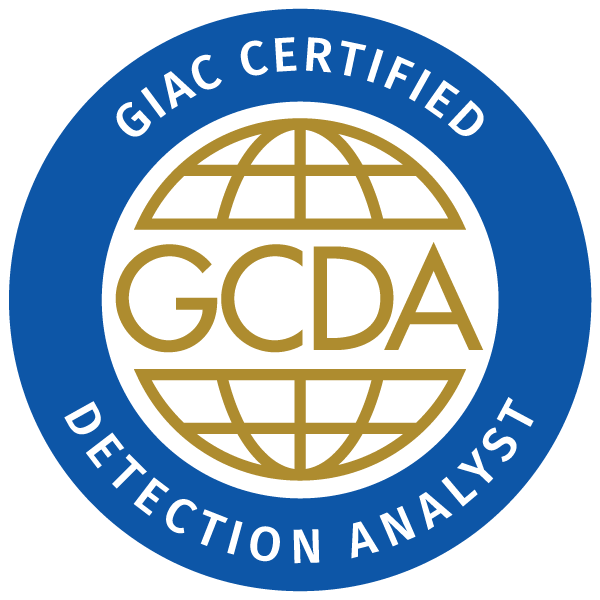Areas Covered
- SIEM Fundamentals
- Service Profiling, Advanced Endpoint Analytics, Baselining and User Behavior Monitoring
- Cloud Logging Solutions in AWS and Azure, SIEM Solutions in Azure
- Tactical SIEM Detection and Post-Mortem Analysis
Who is GCDA for?
- Security Analyst
- Security Architects
- Senior Security Engineers
- Technical Security Managers
- SOC Analysts
- SOC Engineers
- SOC Managers
- CND Analysts
- Security Monitoring Specialist
- System Administrators
- Cyber Threat Investigators
- Individuals working to implement Continuous Security Monitoring
- Individuals working in a hunt team capacity
Exam Format
- 1 proctored exam
- 75 questions
- 2 hours
- Minimum passing score of 79%
Delivery
NOTE: All GIAC Certification exams are web-based and required to be proctored. There are two proctoring options: remote proctoring through ProctorU, and onsite proctoring through PearsonVUE. Click here for more information.
GIAC certification attempts will be activated in your GIAC account after your application has been approved and according to the terms of your purchase. Details on delivery will be provided along with your registration confirmation upon payment. You will receive an email notification when your certification attempt has been activated in your account. You will have 120 days from the date of activation to complete your certification attempt.
Exam Certification Objectives & Outcome Statements
- Application and User Monitoring Analytics The candidate will understand the value of application and user baselines.
- Application Protocol Analytics The candidate will understand some common protocols and how they can be leveraged.
- Asset and Network Analytics The candidate will understand the basics of asset discovery and the value of flow logs.
- Azure and AWS Logging Overview The candidate will understand cloud-native logging solutions within Azure and AWS.
- Defender and Sentinel Overview The candidate will understand Azure-native solutions for enriching logs and alert-response actions.
- Endpoint Analytics The candidate will understand host-specific logs and how they can be leveraged.
- Log Analysis and Alerting The candidate will understand common aggregation and analysis approaches.
- Log Collection and Enrichment The candidate will understand common log types and collection strategies.
- SIEM Overview The candidate will understand the purpose and value of SIEM systems.
Other Resources
- Training is available in a variety of modalities including live training and OnDemand.
- Practical work experience can help ensure that you have mastered the skills necessary for certification.
- College level courses or self-paced study through another program or materials may meet the needs for mastery.
- Get information about the procedure to contest exam results.
Practice Tests
- These tests are a simulation of the real exam allowing you to become familiar with the test engine and style of questions.
- Practice exams are a gauge to determine if your preparation methods are sufficient.
- The practice bank questions are limited so you may encounter the same question on practice tests when multiple practice tests are purchased.
- Practice exams never include actual exam questions.
- Purchase a GCDA practice test here.
- GIAC recommends leveraging additional study methods for test preparation.



